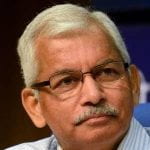This was the ninth webinar in the “Envisioning India” series, co-sponsored by the Sigur Center for Asian Studies and the Institute for International Economic Policy. This is a platform for dialogue and debate. We invited you to engage with us in this series of important discussions.
The “Envisioning India” series is organized under the stewardship of IIEP Co-Director James Foster, Oliver T. Carr, Jr. Professor of International Affairs and Professor of Economics, and IIEP Distinguished Visiting Scholar Ajay Chhibber. The ninth event featured Harsha Vardhana Singh, Chairman, IKDHVAJ Advisers LLP and Former Deputy Director-General at WTO, discussing “India’s Trade Policy: Past, Present, Future.” Dean Alyssa Ayres (GWU), Judith Dean (Brandeis), and Rajeev Kher provided discussant remarks. IIEP Co-Director Jay Shambaugh moderated.
India liberalised its trade regime in 1991 as part of a larger reform initiative. India’s trade surged and the economy grew to become the world’s 5th largest in 2019. Since 2018, India’s trade regime has become more protectionist with an aim to stem the trade deficit and promote domestic industry. India’s concern with a high trade deficit, in particular with China and ASEAN, has also impacted its approach to trade agreements. More recently, India opted out of RCEP. In 2020, India announced a new program of self-reliance (Atmanirbharta). Some fear that this is a signal of turning further inward. Yet India’s stated goals are to attract more FDI – especially as an alternative to China, enter global value chains, and encourage exports. How should we assess India’s recent policy changes and reconcile these shifts? What are the likely pathways for India’s future trade stance? Will India seek to substantively enhance growing US-India trade ties? Will its renewed interest in trade agreements with others such as the EU move forward giving some substantive results? Is it permanently out of RCEP? What steps by other nations could facilitate India’s increased trade engagements with major economies? What choices India makes will affect India and the world. Our distinguished speakers addressed these and related issues in this 9th talk on Envisioning India.
About the speakers:
 Harsha Vardhana Singh is Chairman, IKDHVAJ Advisers LLP, a consulting firm working on trade policy, industrial policy and regulatory issues. He has been a member of High-Level Expert Groups within India and abroad that inter alia address policy concerns related to trade policy, industrial policy, competition and regulatory policy. Earlier, he has worked at the GATT/WTO for 20 years (eight years as Deputy Director General, WTO), was Secretary Telecom Regulatory Authority of India, Executive Director of Brookings India, Senior Fellow at Think Tanks in Switzerland and Canada, taught at Universities in the US and China, and been Chair/secretary of GATT/WTO Dispute Settlement Panels. He has a Ph.D. in Economics from University of Oxford, where he went as a Rhodes Scholar from India in 1979.
Harsha Vardhana Singh is Chairman, IKDHVAJ Advisers LLP, a consulting firm working on trade policy, industrial policy and regulatory issues. He has been a member of High-Level Expert Groups within India and abroad that inter alia address policy concerns related to trade policy, industrial policy, competition and regulatory policy. Earlier, he has worked at the GATT/WTO for 20 years (eight years as Deputy Director General, WTO), was Secretary Telecom Regulatory Authority of India, Executive Director of Brookings India, Senior Fellow at Think Tanks in Switzerland and Canada, taught at Universities in the US and China, and been Chair/secretary of GATT/WTO Dispute Settlement Panels. He has a Ph.D. in Economics from University of Oxford, where he went as a Rhodes Scholar from India in 1979.
As WTO Deputy Director General, he had direct responsibility for Trade in Services, Trade in Agriculture, Sanitary and Phytosanitary Measures, Trade and Environment, Technical Barriers to Trade, Chairman of the Groups on E-Commerce Program and the Cotton Development Agenda. As Economic Advisor and Secretary of Telecom Regulatory Authority of India, he was part of the small group of officials that conceptualized and implemented a number of telecom sector policy reforms, resulting in large growth in the sector.
His recent engagements include: Senior Fellow, Council on Emerging Market Enterprises, The Fletcher School, Tufts University, USA (ongoing); Member of the Advisory Board of UNCTAD’s “Transnational Corporations Journal” (ongoing); Member of the Confederation of Indian Industries (CII) International Trade Policy Council (ongoing); Non-Resident Senior Fellow, South Asia Center, Atlantic Council (ongoing); Senior Research Affiliate, Berkeley APEC Study Center, US (ongoing); Member, High Level Advisory Group on International Trade, established by Government of India; Member, Competition Law Review Committee to revise the Competition Act, established by Government of India; Member, Expert Enquiry Committee Set Up by UK All Party Parliamentary Group on Trade Out of Poverty on “Can the Commonwealth help countries trade out of poverty?”; Member, High Level Board of Experts on the Future of Trade Governance, set up by Bertelsmann Stiftung; Senior Adviser to the Global Commission on Internet Governance on the topic, “Governance of International Trade and the Internet: Existing and Evolving Regulatory Systems”; Senior Advisor, Asia Society Policy Institute, on the topic “India and APEC: Charting a Path to Membership.”
 Alyssa Ayres was appointed Dean of the Elliott School of International Affairs at George Washington University effective February 1, 2021. Ayres is a foreign policy practitioner and award-winning author with senior experience in the government, nonprofit, and private sectors. From 2013 to 2021, she was senior fellow for India, Pakistan, and South Asia at the Council on Foreign Relations (CFR), where she remains an adjunct senior fellow. From 2010 to 2013 Ayres served as deputy assistant secretary of state for South Asia. During her tenure at the State Department in the Barack Obama administration, she covered all issues across a dynamic region of 1.3 billion people at the time (Bangladesh, Bhutan, India, Maldives, Nepal, and Sri Lanka) and provided policy direction for four U.S. embassies and four consulates.
Alyssa Ayres was appointed Dean of the Elliott School of International Affairs at George Washington University effective February 1, 2021. Ayres is a foreign policy practitioner and award-winning author with senior experience in the government, nonprofit, and private sectors. From 2013 to 2021, she was senior fellow for India, Pakistan, and South Asia at the Council on Foreign Relations (CFR), where she remains an adjunct senior fellow. From 2010 to 2013 Ayres served as deputy assistant secretary of state for South Asia. During her tenure at the State Department in the Barack Obama administration, she covered all issues across a dynamic region of 1.3 billion people at the time (Bangladesh, Bhutan, India, Maldives, Nepal, and Sri Lanka) and provided policy direction for four U.S. embassies and four consulates.
Her work focuses primarily on India’s role in the world and on U.S. relations with South Asia in the larger Indo-Pacific. Her book about India’s rise on the world stage, Our Time Has Come: How India is Making Its Place in the World, was published by Oxford University Press in January 2018 and was selected by the Financial Times for its “Summer 2018: Politics” list. An updated paperback edition was released in 2019. She served as the project director for the CFR-sponsored Independent Task Force on U.S.-India relations, and, from 2014 to 2016, as the project director for an initiative on the new geopolitics of China, India, and Pakistan supported by the MacArthur Foundation.
 Judith Dean is the Professor of International Economics in the Brandeis International Business School. Her research focuses on international trade and economic development. Much of her work examines the relationship between trade and the environment. In a series of empirical studies using Chinese data, she has been exploring the possibility that trade growth, foreign investment and production fragmentation may have beneficial effects on the environment. In other work, she studies global value chain trade, non-tariff barriers. and trade preferences for developing countries. Her new work on India explores the impact of trade liberalization on Indian poverty. Judy came to Brandeis from the US International Trade Commission (USITC) where she was a Senior International Economist in the Research Division of the Office of Economics. Prior to joining the USITC, Judy was Associate Professor of Economics at SAIS, Johns Hopkins University, and Assistant Professor at Bowdoin College. She has been a consultant to the World Bank and the OECD, and a Visiting Scholar at the Indian Statistical Institute, New Delhi, India. She has also helped facilitate research collaboration for the USITC with Tsinghua University and the India Development Foundation. Judy was named one of six Visiting Scholars in the Clayton Yeutter International Trade Program, University of Nebraska, 2012-13. In 2018, she gave the 4th Annual John Mason Lecture at Gordon College in 2018. Judy recently completed many years of service on the Board of Directors of World Relief, and the Board of Trustees of Gordon College.
Judith Dean is the Professor of International Economics in the Brandeis International Business School. Her research focuses on international trade and economic development. Much of her work examines the relationship between trade and the environment. In a series of empirical studies using Chinese data, she has been exploring the possibility that trade growth, foreign investment and production fragmentation may have beneficial effects on the environment. In other work, she studies global value chain trade, non-tariff barriers. and trade preferences for developing countries. Her new work on India explores the impact of trade liberalization on Indian poverty. Judy came to Brandeis from the US International Trade Commission (USITC) where she was a Senior International Economist in the Research Division of the Office of Economics. Prior to joining the USITC, Judy was Associate Professor of Economics at SAIS, Johns Hopkins University, and Assistant Professor at Bowdoin College. She has been a consultant to the World Bank and the OECD, and a Visiting Scholar at the Indian Statistical Institute, New Delhi, India. She has also helped facilitate research collaboration for the USITC with Tsinghua University and the India Development Foundation. Judy was named one of six Visiting Scholars in the Clayton Yeutter International Trade Program, University of Nebraska, 2012-13. In 2018, she gave the 4th Annual John Mason Lecture at Gordon College in 2018. Judy recently completed many years of service on the Board of Directors of World Relief, and the Board of Trustees of Gordon College.
 Rajeev Kher superannuated as Commerce Secretary, Government of India in 2015 after a career of 35 years in the Indian Administrative Service. He then worked as a Member in the Competition Appellate Tribunal for two years. He has now associated himself with some leading think tanks. He also advises a Private Equity. His field of experience includes broad areas of International Trade and Commerce, Competition Law and Policy, Sustainable Development Policy, Environmental Management, Global Governance, particularly with reference to trade and environment and Decentralised Governance. He has held several important assignments in the Central Government and the State Government of UP. Some of the more prominent once include a tenure of 9 years in the Department of Trade and Commerce, a stint of 8 years in the Ministry of Environment and The Energy and Resources Institute (TERI) in Delhi and senior level assignments in the Departments of Renewable Energy, Finance, Planning and Science and Technology, besides administering two very challenging charges of District Magistrates. He is credited with bringing in the first comprehensive Foreign Trade Policy for India. His vision on international trade issues has been well respected by the stakeholder community within India and abroad. He led negotiations on behalf of his country for Trade Agreements with major blocks such as EU, EFTA, RCEP and ASEAN. His initiatives to bring discourse on India’s competitiveness in Trade in Services, evolution of Policy on Technical Regulations and Standards and India’s position on the Global and Regional value chains in the forefront of Policy making are much recognised by the stakeholder community. He is also credited with hand holding the Pharmaceutical sector in its pursuit to become global leader in Generic Medicine and his work is highly appreciated by the industry. He has published work on India’s Patent Policy, Trade Policy, WTO Dispute Settlement Mechanism, Product standards and Technical Regulations and several other related areas.
Rajeev Kher superannuated as Commerce Secretary, Government of India in 2015 after a career of 35 years in the Indian Administrative Service. He then worked as a Member in the Competition Appellate Tribunal for two years. He has now associated himself with some leading think tanks. He also advises a Private Equity. His field of experience includes broad areas of International Trade and Commerce, Competition Law and Policy, Sustainable Development Policy, Environmental Management, Global Governance, particularly with reference to trade and environment and Decentralised Governance. He has held several important assignments in the Central Government and the State Government of UP. Some of the more prominent once include a tenure of 9 years in the Department of Trade and Commerce, a stint of 8 years in the Ministry of Environment and The Energy and Resources Institute (TERI) in Delhi and senior level assignments in the Departments of Renewable Energy, Finance, Planning and Science and Technology, besides administering two very challenging charges of District Magistrates. He is credited with bringing in the first comprehensive Foreign Trade Policy for India. His vision on international trade issues has been well respected by the stakeholder community within India and abroad. He led negotiations on behalf of his country for Trade Agreements with major blocks such as EU, EFTA, RCEP and ASEAN. His initiatives to bring discourse on India’s competitiveness in Trade in Services, evolution of Policy on Technical Regulations and Standards and India’s position on the Global and Regional value chains in the forefront of Policy making are much recognised by the stakeholder community. He is also credited with hand holding the Pharmaceutical sector in its pursuit to become global leader in Generic Medicine and his work is highly appreciated by the industry. He has published work on India’s Patent Policy, Trade Policy, WTO Dispute Settlement Mechanism, Product standards and Technical Regulations and several other related areas.
About the Moderator:

James E. Foster is the Oliver T. Carr, Jr. Professor of International Affairs, Professor of Economics, and Co-Director of the Institute for International Economic Policy at the George Washington University. He is also a Research Associate at the Oxford Poverty and Human Development Initiative at Oxford University. Professor Foster’s research focuses on welfare economics — using economic tools to evaluate and enhance the wellbeing of people. His work underlies many well-known social indices including the global Multidimensional Poverty Index (MPI) published annually by the UNDP in the Human Development Report, dozens of national MPIs used to guide domestic policy against poverty, the Women’s Empowerment in Agriculture Index (WEAI) at USAID, the Gross National Happiness Index of Bhutan, the Better Jobs Index of the InterAmerican Development Bank, and the Statistical Performance Index of the World Bank. Prof. Foster received his PhD in Economics from Cornell University and has a Doctorate Honoris Causa from Universidad Autónoma del Estado Hidalgo (Mexico).
This event and seminar series was jointly organized with the Oxford Poverty & Human Development Initiative (OPHI) and the UNDP Human Development Report Office.

 Catherina Pattillo is a Deputy Director in the IMF’s African Department where she oversees work on several countries, as well as on climate change, capacity development, gender and research. Since joining the Fund from a position at Oxford University, she has worked in the Fiscal Affairs Department where she was chief of the division responsible for the IMF’s Fiscal Monitor, the Research Department, and on countries in Africa and the Caribbean, and the Strategy, Policy and Review Department where she worked on low-income country issues, and emerging issues such as gender, inequality, and climate change. She has published in these areas, as well as on Sustainable Development Goals, firm dynamics in sub-Saharan Africa, growth, investment, debt, monetary and exchange rate policies, aid, and currency crises. She received her Ph.D in Economics from Yale University.
Catherina Pattillo is a Deputy Director in the IMF’s African Department where she oversees work on several countries, as well as on climate change, capacity development, gender and research. Since joining the Fund from a position at Oxford University, she has worked in the Fiscal Affairs Department where she was chief of the division responsible for the IMF’s Fiscal Monitor, the Research Department, and on countries in Africa and the Caribbean, and the Strategy, Policy and Review Department where she worked on low-income country issues, and emerging issues such as gender, inequality, and climate change. She has published in these areas, as well as on Sustainable Development Goals, firm dynamics in sub-Saharan Africa, growth, investment, debt, monetary and exchange rate policies, aid, and currency crises. She received her Ph.D in Economics from Yale University. Steve Suranovic
Steve Suranovic  Ivanova Reyes is an economist working in the Regional Studies Division of the International Monetary Fund’s African Department. Prior to joining the IMF, she worked at Gettysburg College, the World Bank, Inter-American Development Bank, Ministry of Economy of the Dominican Republic (DR), Superintendency of Pensions of the DR and Pontificia Universidad Catolica (PUCMM) of DR. She holds a PhD in Economics from American University, a masters in economics from Georgetown University and a masters in applied macroeconomics from the Pontificia Universidad Catolica (PUC) of Chile. Her research is focused on analyzing the impact of China’s economy on Latin America and the Caribbean.
Ivanova Reyes is an economist working in the Regional Studies Division of the International Monetary Fund’s African Department. Prior to joining the IMF, she worked at Gettysburg College, the World Bank, Inter-American Development Bank, Ministry of Economy of the Dominican Republic (DR), Superintendency of Pensions of the DR and Pontificia Universidad Catolica (PUCMM) of DR. She holds a PhD in Economics from American University, a masters in economics from Georgetown University and a masters in applied macroeconomics from the Pontificia Universidad Catolica (PUC) of Chile. Her research is focused on analyzing the impact of China’s economy on Latin America and the Caribbean.
 Qianqian Zhang is an economist in the African Department at the IMF. Her research interests include fiscal policy, fiscal decentralization, gender, and development issues. She previously worked in the Fiscal Affairs Department and as a country economist for Afghanistan. She received her PhD from George Washington University and her master’s degree from Cornell University.
Qianqian Zhang is an economist in the African Department at the IMF. Her research interests include fiscal policy, fiscal decentralization, gender, and development issues. She previously worked in the Fiscal Affairs Department and as a country economist for Afghanistan. She received her PhD from George Washington University and her master’s degree from Cornell University. Moses Kansanga is an Assistant Professor of Geography and International Affairs at The George Washington University. He is a critical geographer whose research explores questions at the intersection of sustainable food systems and natural resource management from a political ecology perspective. For the past decade, Moses has worked with smallholder farming communities in the Global South with concentration on sustainable agriculture and natural resource politics. He received his PHD at University of Western Ontario.
Moses Kansanga is an Assistant Professor of Geography and International Affairs at The George Washington University. He is a critical geographer whose research explores questions at the intersection of sustainable food systems and natural resource management from a political ecology perspective. For the past decade, Moses has worked with smallholder farming communities in the Global South with concentration on sustainable agriculture and natural resource politics. He received his PHD at University of Western Ontario. Robert Weiner is the director of the Master of Science in International Business program and a professor of international business, public policy & public administration, and international affairs at the George Washington University School of Business, Washington D.C. He serves concurrently as deputy director of the Master of Science in Government Contracts, a joint program of the GW Schools of Business and Law. He is a faculty director of the Business School’s Center for International Business Education and Research, and an affiliate of the Elliott School of International Affairs’ Institute for International Economic Policy, Institute for Middle East Studies, Institute for Security and Conflict Studies, and Sigur Center for Asian Studies. He is also senior advisor to the Brattle Group. He received his PhD from Harvard University.
Robert Weiner is the director of the Master of Science in International Business program and a professor of international business, public policy & public administration, and international affairs at the George Washington University School of Business, Washington D.C. He serves concurrently as deputy director of the Master of Science in Government Contracts, a joint program of the GW Schools of Business and Law. He is a faculty director of the Business School’s Center for International Business Education and Research, and an affiliate of the Elliott School of International Affairs’ Institute for International Economic Policy, Institute for Middle East Studies, Institute for Security and Conflict Studies, and Sigur Center for Asian Studies. He is also senior advisor to the Brattle Group. He received his PhD from Harvard University. Sunil Sharma is a Distinguished Visiting Scholar at the Institute for International Economic Policy, Elliott School of International Affairs, The George Washington University, Washington, D.C., USA, and a Senior Associate at the Council on Economic Policies, Zurich, Switzerland. He was Assistant Director in the IMF’s Research Department from 2015-2018, and the Director of the IMF-Singapore Regional Training Institute (STI) in Singapore from 2006-2015. Before moving to Singapore in 2006, he was Chief of the IMF Institute’s Asian Division in Washington, D.C. Prior to joining the IMF in 1992, Dr. Sharma was on the Economics faculty at the University of California, Los Angeles (UCLA). He has a Ph.D. and M.A. in Economics from Cornell University, and his current interests include rethinking capitalism and democracy, systemic hazards, complex systems, the international financial architecture, and the institutional structure and design of financial regulation.
Sunil Sharma is a Distinguished Visiting Scholar at the Institute for International Economic Policy, Elliott School of International Affairs, The George Washington University, Washington, D.C., USA, and a Senior Associate at the Council on Economic Policies, Zurich, Switzerland. He was Assistant Director in the IMF’s Research Department from 2015-2018, and the Director of the IMF-Singapore Regional Training Institute (STI) in Singapore from 2006-2015. Before moving to Singapore in 2006, he was Chief of the IMF Institute’s Asian Division in Washington, D.C. Prior to joining the IMF in 1992, Dr. Sharma was on the Economics faculty at the University of California, Los Angeles (UCLA). He has a Ph.D. and M.A. in Economics from Cornell University, and his current interests include rethinking capitalism and democracy, systemic hazards, complex systems, the international financial architecture, and the institutional structure and design of financial regulation. Nicoletta Batini is the Lead Evaluator of the International Monetary Fund’s (IMF) Independent Evaluation Office. Prior to the IMF, she was Advisor of the Bank of England’s Monetary Policy Committee, Professor of Economics at the University of Surrey, and Director of the International Economics and Policy Office of the Treasury in Italy. She holds a Ph.D. in international finance (S.S.S.U.P. S. Anna) and a Ph.D. in monetary economics (University of Oxford). Today her research focuses on the economics of energy and land and sea use transitions for climate mitigation. Her new book “The Economics of Sustainable Food: Smart Policies for People and the Planet” was just published by Island Press and the International Monetary Fund.
Nicoletta Batini is the Lead Evaluator of the International Monetary Fund’s (IMF) Independent Evaluation Office. Prior to the IMF, she was Advisor of the Bank of England’s Monetary Policy Committee, Professor of Economics at the University of Surrey, and Director of the International Economics and Policy Office of the Treasury in Italy. She holds a Ph.D. in international finance (S.S.S.U.P. S. Anna) and a Ph.D. in monetary economics (University of Oxford). Today her research focuses on the economics of energy and land and sea use transitions for climate mitigation. Her new book “The Economics of Sustainable Food: Smart Policies for People and the Planet” was just published by Island Press and the International Monetary Fund. Bruce Friedrich is co-founder and executive director of the Good Food Institute. With branches in the United States, India, Israel, Brazil, Europe, and Asia Pacific, GFI is accelerating the production of plant-based and cultivated meat in order to bolster the global protein supply while protecting our environment, promoting global health, and preventing food insecurity. Bruce oversees GFI’s global strategy, working with directors and international managing directors to ensure that GFI is maximally effective at delivering mission-focused results. Bruce graduated from Georgetown Law and also holds degrees from Johns Hopkins University and the London School of Economics. Bruce was named 2021 “American Food Hero” by @EatingWell Magazine.
Bruce Friedrich is co-founder and executive director of the Good Food Institute. With branches in the United States, India, Israel, Brazil, Europe, and Asia Pacific, GFI is accelerating the production of plant-based and cultivated meat in order to bolster the global protein supply while protecting our environment, promoting global health, and preventing food insecurity. Bruce oversees GFI’s global strategy, working with directors and international managing directors to ensure that GFI is maximally effective at delivering mission-focused results. Bruce graduated from Georgetown Law and also holds degrees from Johns Hopkins University and the London School of Economics. Bruce was named 2021 “American Food Hero” by @EatingWell Magazine. Ann Florini is Clinical Professor at the Thunderbird School of Global Management at Arizona State University, where she directs programs at the Washington, DC campus. She was previously Professor of Public Policy at Singapore Management University; founding Director of the Centre on Asia and Globalization at the National University of Singapore; and a Senior Fellow at the Brookings Institution. She has spearheaded numerous international initiatives on global governance, energy and climate policy, and cross-sector collaborations involving government, civil society and the private sector. Her many books and articles have addressed governance in China, transparency in governance, transnational civil society networks, and the role of the private sector in public affairs. Dr. Florini received her Ph.D. in Political Science from UCLA and a Masters in Public Affairs from Princeton University.
Ann Florini is Clinical Professor at the Thunderbird School of Global Management at Arizona State University, where she directs programs at the Washington, DC campus. She was previously Professor of Public Policy at Singapore Management University; founding Director of the Centre on Asia and Globalization at the National University of Singapore; and a Senior Fellow at the Brookings Institution. She has spearheaded numerous international initiatives on global governance, energy and climate policy, and cross-sector collaborations involving government, civil society and the private sector. Her many books and articles have addressed governance in China, transparency in governance, transnational civil society networks, and the role of the private sector in public affairs. Dr. Florini received her Ph.D. in Political Science from UCLA and a Masters in Public Affairs from Princeton University.













